Unbreakable / Nezlamni
“War is another case I need to win,” Inga Kordynovska on the humanitarian centre in Odesa
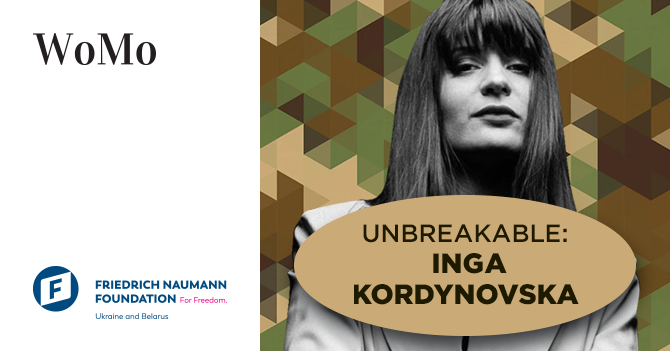
Inga Kordynovska is the owner of a law firm, who despite the threat of occupation of Odesa at the beginning of the war stayed in the city and established the Humanitarian Volunteer Centre in Odesa and then two more projects to help internally displaced people, mothers in particular. In the “Unbreakable” project, Inga shares how legal practice helped her during the war and why humanitarian aid is not her main goal in helping those affected by the war.
We haven’t dealt with a war before, but we’ll rise to the challenge
I am the owner of a law firm. Our areas are legal support for businesses, international trade, family law and trust, support of public initiatives. I’ve been working in the area of family law and business, because I am an entrepreneur myself and I hold two degrees in law and management. I understand what a business needs and that helps me provide good legal advice.
I took the start of the war as another task. It is a shocking event, but it is also a challenge we have to face. Before, COVID-19 was the challenge, and now it’s the war.
There is a practice in our company when we take on cases that seem to be impossible to resolve. I am talking about the cases that stretch to over 20 years or where oligarchs are persons of interest, or those related to government interests. You begin to untangle the threads, pull one at a time and gradually untangle the case. After dealing with a number of such cases in the past decade, I came to realise that nothing is impossible, so I took the war as another challenge, although an unimaginable one.
Within two hours I analysed everything and decided to act: the decision to stay in Odesa
I woke up at 7am, and two hours later I made a decision to stay in Odesa. I remember I started getting calls at 9am from my clients I had planned to meet that day. I assured them that everything was going according to plan, because there are cases you can’t put off, for example those related to child abduction or domestic violence. Even the war cannot stand in the way of resolving these pressing cases.
I was analysing the possible development of events, taking into account availability of resources, money and transport.
The first option was to do nothing and flee, but I remembered advice from the book Mastering Fear written by a former US Navy seal. I read it a long time ago from the standpoint of legal practice: I had corruption cases and sometimes received threats. In moments like that, you start to wonder what fear really is, how it works, when it protects and when it scares and paralyses you. The author explained perfectly how a person can tame their fear and how to distinguish whether your fear is rational and helps you avoid danger and when it is just panic. In the morning of February 24, I experienced a panic attack, when you grab a bag just to flee somewhere. But then I remembered practices from the book and began to analyse. I realised that from a psychological point of view, going somewhere and doing nothing is a road to depression. That’s how you lose your strength. So, I dismissed that option.
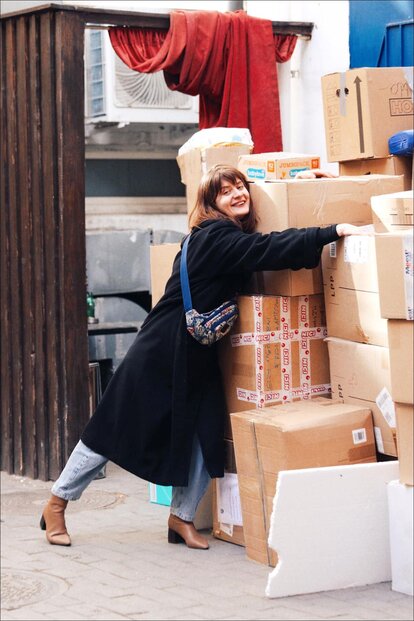
The other option was to go to Western Ukraine to my parents, where I have a house. However, I’ve been living in Odesa for 14 years, often participating in the social processes taking place in the city since 2014. So, this was a morally unacceptable option for me too. Besides, the situation with safety all across the country was rather questionable, as the attacks could be directed anywhere. There was a high risk of occupation in the first days in Odesa, so I understand why my parents were hysterical. For my part, I decided that I would consider leaving, if the Russian paratroopers landed in Odesa and captured the city. I thought: “The city needs me, I have the knowledge and experience, and I could do a lot. I couldn’t just move and sit at home on the sofa; that’s not the kind of person I am.
The third option was to go to Europe and organise a humanitarian hub there, but I also dismissed it. I divide people into two categories: war people and peace people. The former always fight for something, and I am one of those people because of my character, childhood experience and profession, as I always fight for somebody’s rights and interests. I would not be comfortable living in Europe. That’s more the story of the peace people, who can organise all these things without any real threat to life, crazy pressure, etc.
Having analysed my skills, experience and conquered my fear, I knew where I could realise myself the best. I stayed where I am now to do what I can right here.
I have a legal practice that has saved me on more than one occasion. During a crisis you have to think how to do the opposite of what everyone does. I knew that everybody would rush to leave, that the roads and border crossing points would be crowded and there would be shortage of gasoline. I knew that if I did decide to leave, the most sensible thing would be to wait for 2-3 days, instead of following everybody caught in their fear and fleeing somewhere. When you make a panic decision, this decision works against you, because it is illogical and irrational. I understand the people who were fleeing, because missiles were flying over their homes, but the majority did so out of panic.
For example, when I did come to my parents, who live near the border, two months later, my mom said: “Everything has been quiet in our city since the beginning, but the residents rushed to the border in the first days of the war, preventing those who indeed suffered in the war from fleeing the country.” This is a vivid example of irrational fear, when it doesn’t protect you, making you do crazy things that lead to an impasse instead.
The idea of creating a humanitarian centre in Odesa
Nobody comes to a lawyer happy; everybody comes with pain, problem, suffering, unforeseen events. A war is very similar to another legal task, but this is the case of an entire country, not just one client.
During the first days, some volunteers were panicking, others – were frustrated. The former were buying food and stuff and delivering all of it to the military, without asking whether they were needed or not, while the latter did nothing. Those are classic human reactions to stress: to freeze or to run. These reactions needed to be rationalised.
When I decided to create a humanitarian centre, one of its purposes was to give the people that stayed in Odesa an opportunity to manage stress. I had hoped that some would work at the centre and not think about the news, and some would donate and feel their involvement. And it worked. I did not expect this kind of scale, because 300 people got involved in the centre in the first week alone.
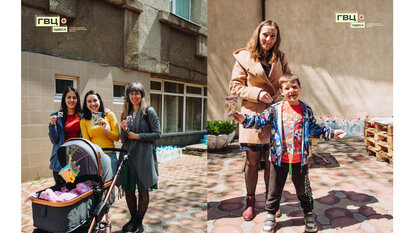
The humanitarian centre in Odesa
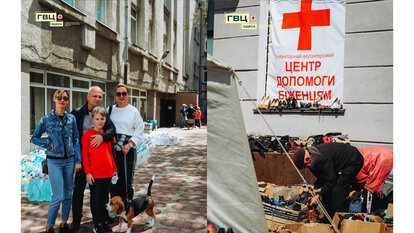
The humanitarian centre in Odesa
Herd mentality that people experience at the level of instincts also helped: when a zebra runs away from the herd, it is more likely to die than when the herd sticks together. It’s the same with people: when we are scared we don’t want to be alone, we want to join a community that will give us a sense of security.
It worked for me as well. The first week was hectic at the centre, but subsequently we built stability. My mom called me every day asking to flee to Western Ukraine, but I no longer could: people who came to the centre, saw me every day, got used to me, counted on me… That was stability to them and I could not just leave one day and demoralise everybody… My mom gradually stopped crying and I felt lighter, because constant pressure from relatives is quite exhausting.
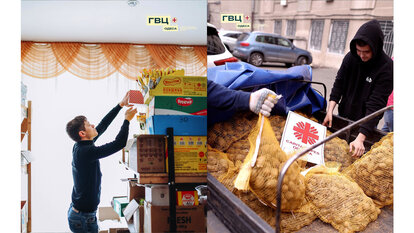
The humanitarian centre in Odesa
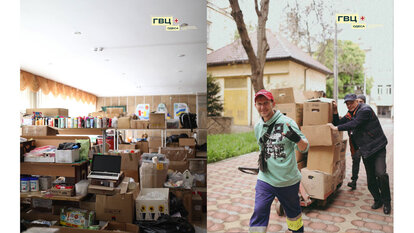
The humanitarian centre in Odesa
The centre became my place of power. You read the news, shells explode over your head, the sirens go off. There were also many sabotage groups in Odesa. You feel this danger in the air, as you return home at 2am. You are stopped and searched (because unfortunately I was never able to finish work at the centre before the curfew and simply didn’t have the time to obtain a permit); there are checkpoints, barbed wires everywhere around you and there are no lights. It’s terrifying. I only saw such an apocalypse in movies. The work at the centre was life-saving.
Organising the operation of the humanitarian centre and scaling it
During the first month, I had a feeling that a day was like a month of normal life. Everything was moving so fast that I still can’t comprehend how we could physically do it. The problems appeared and changed rapidly. The things we were doing a week ago quickly became irrelevant.
Our primary task was to help the army. There was a high risk of occupation of Odesa, and we had to prepare as well as we could to fight back. The second task was to give people new meanings so that they could overcome new challenges.
In three weeks, Mykolaiv stopped the front line there, so we could heave a sigh of relief and not think constantly about the occupation. Then we witnessed the atrocities in Bucha and Irpin and decided that we have to help not only the army, but also civilians. We had thought about it back in the beginning, knowing that there would be many victims once the occupied cities were liberated. It’s just that nobody could predict such a scale of crimes at the time.
The local authorities joined us. It was rather a challenge, because, unfortunately, before the war, Odesa had pro-russian authorities. During the first two weeks of the war, our mayor did not publish even one post about the war. And it shocked me. So, when the local authorities contacted our centre and offered cooperation, I was sceptical. However, Mykola Viknyanskiy, one of my partners, convinced me to join forces because the war continued. On March 27, together with the city authorities, we opened four humanitarian aid centres in the city. We brought aid from big warehouses in Odesa, where it was delivered from our sister cities. Our volunteers arranged this process. We organised quick service at the centres, so that people did not have to wait for hours, and created a humanitarian aid tracking system.
We had lines of internal displaced people forming at the centres in the middle of April, and in May, the centres were already operating without my involvement and with a different team of volunteers.
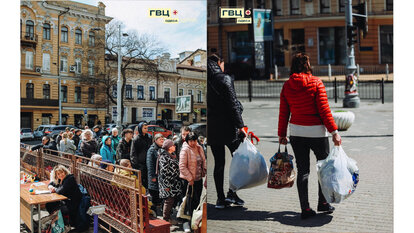
The humanitarian centre in Odesa
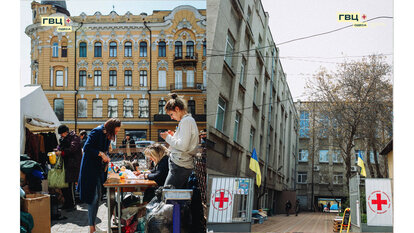
The humanitarian centre in Odesa
On June 9, we terminated the memorandum with the local authorities, because the mission was complete and we were moving forward, although the centres continue to operate to this day. In the beginning of May, we moved from a food market to a school, because the market was opening to work as a restaurant. A part of the school was an IDP centre and the other part was our primary headquarters focused on helping the army, since the centres only provided assistance to internally displaced people. Now, the school has asked us to vacate the premises, because they are preparing for the school year. Therefore, we have currently suspended our operation, until we sign a new lease agreement, move and conduct an audit.
Back in the beginning of May, I emphasised that humanitarian aid is emergency assistance for people who lost everything and that we needed to launch projects that would also help them recover and return to life, because a person cannot always be in an ‘emergency room’.
“Room of Requirement” and “Sandbox”
That’s how two new projects were born. The “Room of Requirement” ("Vyruchai Kimnata" in Ukrainian) helps people find a home, a job, doctors – everything you may need at a new place to return to your normal life.
Shelters are good, but people cannot live in gyms for months; they need a home and a job. Internally displaced people, for example, don’t know which realtor they can trust and where to look for a job. We are here to help them.

Інга Кординовська | Inga Kordynovska | Inga Kordynowska
I moved to Odesa many years ago and I still remember the stress of it all. Now, at the time of war, this stress is even more intense. Therefore, we started looking for ways to become a friendly centre that helps people adapt and socialise in new conditions and makes them feel at home. A home is not an apartment you live in. A home is when you know where to buy good coffee, where to find a good doctor, which market sells the best meat, where to get the cheapest food products, etc.
At first, our office was to be based at a food market, but something didn’t work out, so we will be working online for now. We have applied for grants and expect to win at least some of them to continue working.
The second project is called the “Sandbox” ("Pisochnytsya" in Ukrainian). We are developing it together with the namesake foundation and designer Yulia Paskal, who is my client. The idea of the project was conceived when Maryna, the founder of the Pisochnytsya Charity Foundation, which used to help the military by supplying bags of sand, came to me. I told her that every other woman was telling us that she would like to find a job, but she didn’t have anybody to leave her children with, because the kindergartens were closed and she didn’t have the money to hire a nanny. Therefore, I suggested using the “Sandbox” for its intended purpose and creating a small kindergarten or an activity room, where women could leave their children and go to work. They would take turns babysitting. One day, one woman is at work, and the next she’s babysitting other children so that their mothers could also do something. It’s mutual help and socialisation, because mothers would communicate with each other.
It is taking us a long time to find a premise, because a bomb shelter is our key criterion and that complicates things. We are currently in talks with several premises and we are hoping to resolve this issue soon.
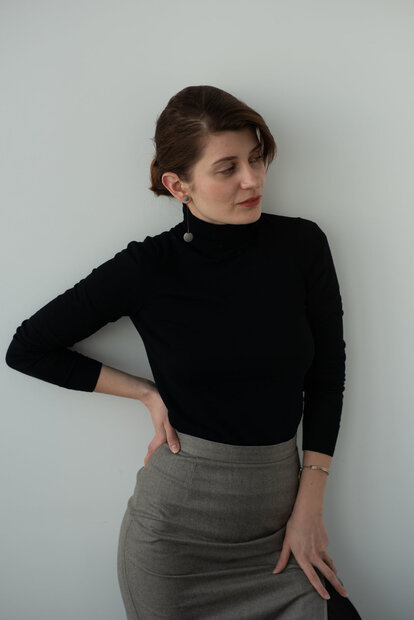
Інга Кординовська | Inga Kordynovska | Inga Kordynowska
We will launch the pilot project in Odesa and then expand to other cities, as the number of internally displaced people is growing, specifically women with children, who don’t have any friends at the new place and cannot pay for a babysitter. I believe that this project will continue even after the war, as the kindergartens are open until afternoon, while many women have to work late. We would like to use this project to help women be independent.
When I suggested these two ideas, not everybody supported me. Many volunteers were offended, arguing: “How so? People don’t have anything left and we will be offering them a job or a babysitter?” I, however, believe that these projects are necessary, because there is less assistance by day, and it is more expensive to bring it from Europe, which means there is sense in trying to make money circulate in the economy.
The war crashed the illusions of people who complained about Ukraine
As I was working as a lawyer, zero corruption was one of our key values. I was told that I was an idiot and that with that kind of approach I could starve to death in Ukraine. I responded that it was my value and I would carry it despite everything, because I couldn’t do it any other way. My clients often wanted to resolve an issue with a bribe, but I refused and we won the case in court. I had my clients then tell me that I was returning their faith in the state, because they did not believe in fair trial.
For 13 years I’ve been winning cases in court without a penny of a bribe, although it’s always been very difficult for me to go against the flow. Now I can heave a sigh of relief, because finally the flow turned towards my values and it is now easier for me, because everybody realised how cool our state is. The people that fled to Europe and have had an opportunity to compare living here and there have started to particularly appreciate Ukraine.
Our firm has extensive experience of working with foreign courts. I know how much time it takes to obtain a document or reference. I’ve never had any illusions about this matter. Maybe this was one of the reasons why I didn’t want to leave, because I knew that it wouldn’t have been better than in Ukraine.
I love my country and when I’m being told that everything is bad here, I tell them that they have no idea how good it is here. For example, four years ago I attended the innovating justice forum at the Hague and proudly told representatives of the European countries about innovative justice and they hung onto my every word.
The war destroyed these illusions in many people. Everybody realised what a great country we are living in. Yes, we do have problems, same as foreign countries: we have ours and they have theirs. We need to resolve these problems, not flee, not move to another country. If there is a problem, we work to resolve it. That’s called the process of development.
I am very happy that I no longer have to prove to anybody that we live in a great country, because everybody has had an opportunity to see it for themselves. Many people have changed their attitude towards Ukraine; they started to appreciate what seemed ordinary or imperfect to them.
Before, we were imposed a narrative that we were poor and miserable, but the war eradicated this inferiority complex. Everything starts with the head: when we were complaining about our country, blaming it for everything not being right, it was a strong inner message. Now, we’ve seen that we are strong and Europe has a lot to learn. At the same time, it is important to analyse the good things in those countries and borrow them. The war uncovered all our shortcomings and we will have to mercilessly fight them in the years to come in order to build our country as it deserves to be.
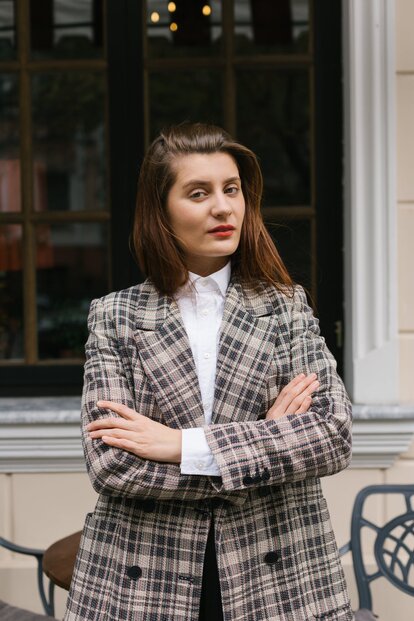
Інга Кординовська | Inga Kordynovska | Inga Kordynowska
As I was reading a book about Winston Churchill, I was shocked to learn how quickly European countries gave up during World War II – an hour, four hours or two days. We have been holding on for over four months now and we are being told about signing some peace treaty. Many foreign journalists say they would not have fought like that, but would have just given up right away. We took the hit and showed that we are fighting for democratic values, that we are giving our lives for it and that’s a powerful indicator. Russia claimed the victory in World War II, although it was largely fought in the territory of Ukraine. For 70 years, Russia’s victory was being imposed on us, so that we would forget our own importance.
It is important to understand now that this is our victory, our power and we cannot allow for it to be taken away from us. The inferiority complex must disappear forever.
We need to switch from the “war and fight” mode to “living” mode
When I tried going back to my pre-war life, for example to dance or sew a dress, or even take a bath, a part of me resisted. I saw the long lines for a couple of litres of water in Mykolaiv and thought to myself: “What are you thinking about taking a bath, when people don’t have water to drink?” I did understand that if I forbid myself to take a bath, that wouldn’t solve the situation with drinking water in Mykolaiv.
For as long as I can afford certain luxury, I should allow myself to enjoy it. So, if you can wear dresses, bake pies or dance, and it makes you happy, then you should do it. Add such pre-war things to your life gradually, first ten minutes a day and then more. These things will give you something to live for.
You need to switch from the “war and fight” mode to “living” mode, when you are not fighting, but just enjoying life. Even if it is for a little bit, it will be what gives you joy and strength.
These are my personal batteries, when I’m simply enjoying life: reading books, ballroom dancing, getting a tan in a courtyard in Odesa. In those moments, I can feel that there is life and it continues, and I’m just recharging this way. Every day, I try to find more time to add things that make me feel alive, that bring joy to my life and give me strength to move forward.
Some people worry that they could spend this time working, but there is no need to be concerned about it because it works the other way around. This way, you have more strength to do the work faster, and the things that previously took you a week to do get done in two days, because you have the strength.
At the end of April, I felt physically exhausted, because I was working with no days off. Then, suddenly, I had to go to Lviv to sign a memorandum between two foundations. I had a feeling that I was betraying Odesa by leaving, but staying at my parents’ dacha that week I felt that I couldn’t keep running like that. Upon returning, I changed my schedule in order to be able to continue working.
I started looking for my batteries, remembering what gives me energy and brings me joy. You can’t do a lot of things during the war, like go to a concert, but you can go take a bath or have a massage. I found the desire to do something again. Now, I try to balance.
Some people accuse me that I am no longer so frequently involved in the processes, but I respond that I cannot constantly work 18 hours a day. There was a period when it was necessary and that’s what I did, but now I have to think about myself, because if I run out of fuel, everything else will end too.
Let me quote one of the teachers from my Lviv school: “You must remember that every businessman has to take care of their own consciousness, because you are the driver of your project. If you’ve lost your drive and dropped out of this process, everything will stop and won’t progress further. Therefore, your first task is to maintain that drive.” The skill not to burn out is your obligation, so that you have the strength to run this marathon. Being able to experience peaceful joys helped me.
Asceticism is much harder for women than for men. The small things, like coffee, manicure, and a dress are important to women. We need to bring them back to our lives, no matter how absurd it seems, when the front line is just 100 km away. That’s what brought my drive back. I was able to manage the firm and keep the centre, while still having something for myself.
Life has changed forever: plans for after the war
ife has changed forever for me, and it will never be the way it was before the war. I reorganised the work of my company so that we could earn in the new conditions, because my business must go on despite all, and I have to pay salaries to my people despite everything. My personal achievement is that my people received pre-war salaries in June. I had been working on that starting from March. Many businessmen justify their actions with the war and don’t pay full salaries, but I wanted to set this goal right from the start. In April, it seemed impossible, but I found a way to achieve that goal. You have to imagine that it will now always be like that, that these are your conditions and you have to adapt to them. We will win, but right now it is not clear when. It is important not to wait for the victory, because that’s a road to nowhere. We need to live in the new reality.
Nobody needs your business now? Start another business. We need to quickly adapt and seek new opportunities, accepting the reality. This is probably one of my most important achievements at the age of 30 – to accept reality. I also do a lot to change this reality and bring our victory closer, but it is not an attempt to reject the reality, but a way to mitigate it. Everything I can do is to react to reality. You need to take the form of water and run around all the difficulties, not try to move them away.
My ex-fiancé said in 2014, when he was a sniper during the ATO: “When I know that I have to come back, that somebody is waiting for me, then I come back, because I know that there is something worth coming back for, but when there is no future, there is no sense in living right now as well.” Therefore, it is important to set goals, plans and not to cancel your dreams. This creates a link between today and the future and you follow it even when there is hell around you.
During the war, a lot of projects appeared and I’ve met many people, and learned a lot. Therefore, I will no longer be able to stick myself back to the legal field after the war. I don’t know yet what I will do, whether it will be public activity or business. Maybe one of the projects will grow into a business. The experience of the last four months greatly expanded my personality.
This article was prepared by the editorial office of Ukrainian women´s magazine WoMo as a part of the "Unbreakable" author´s special project in cooperation with Friedrich-Naumann-Foundation for Freedom in Ukraine supported by the Federal Foreign Office.

Education against war
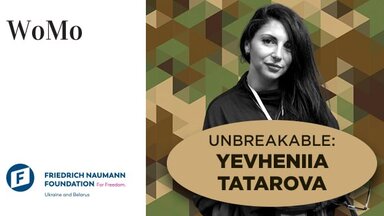
Yevheniya Tatarova, director of the Kiev office of the Continuing Education School for English Teachers, became a displaced person for the second time at the beginning of the war. To support the Ukrainian army, she held a seminar with English teachers lasting several hours, which raised 4,000 US dollars. She handed over the collected donations to the Serhij Prytula Foundation for the Ukrainian military. In the project "The Indomitable", Tatarova talks about finding new meanings during war and how the English language helps the Ukrainian army.
“Nobody slept in the first several months”
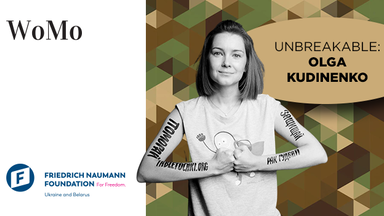
Olga Kudinenko is the founder of Tabletochki, a charity foundation for children with cancer, a fundraiser and a Member of the National Children’s Hospital’s OKHMATDYT Board of Trustees. In the “UNBREAKABLE” project, she shared how the foundation helped evacuate children with cancer from dangerous territories, and spoke about establishing a foundation in the U.S. and helping Ukrainians, while she’s staying abroad.
Ola Rondiak: "Today Ukraine reclaims its identity"
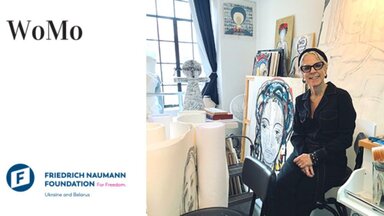
Ola Rondiak, a U.S. artist of Ukrainian origin, was born and raised in emigration. After Ukraine gained independence, she decided to return to her homeland. The artist is now witnessing how Ukrainians are once again fighting for their identity. And that is what she shows in her works. In an interview for WoMo, Ola shares what she felt when the war started, where she finds strength to fight and how she creates art to help the army. This article was prepared by the editorial office of Ukrainian women´s magazine WoMo as a part of the author´s special project "Unbreakable" in cooperation with Friedrich-Naumann-Foundation for Freedom in Ukraine.